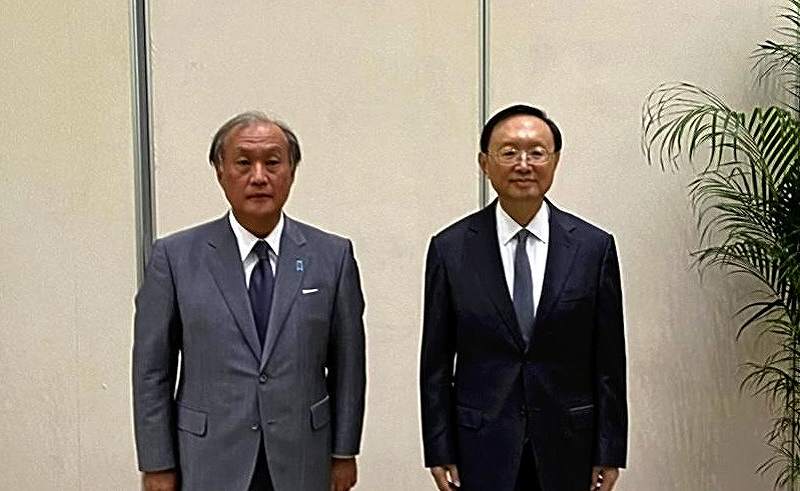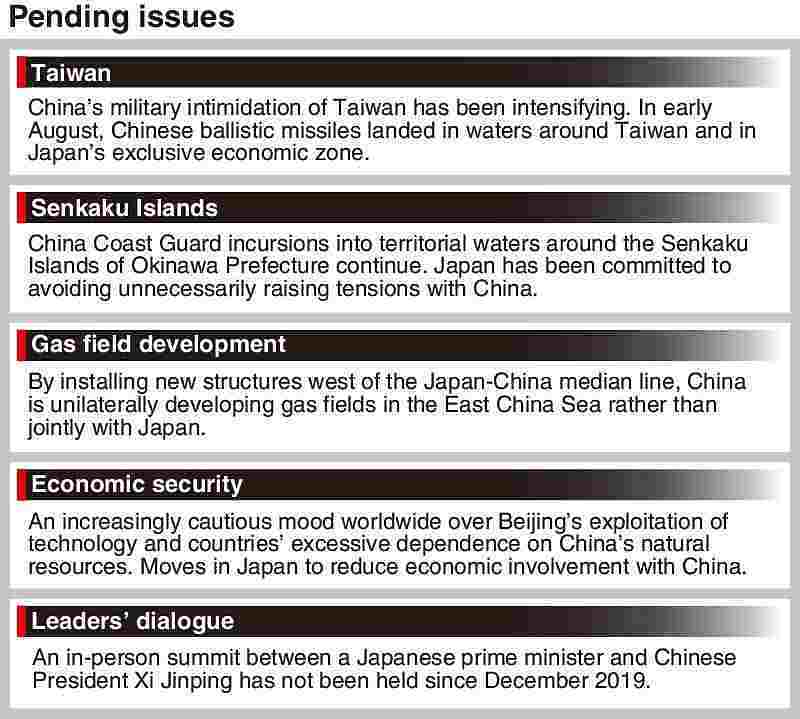50 years of Japan-China ties / Taiwan issue lurks as neighbors try to feel each other out behind closed doors

Takeo Akiba, secretary general of the National Security Secretariat, left, and Yang Jiechi, China’s top diplomat, stand for a photo before their talks in Tianjin, China, on Aug. 17.
6:00 JST, September 30, 2022
On Sept. 29, Japan and China marked the 50th anniversary of the normalization of their diplomatic relations in 1972. Going forward, how should Japan deal with a China that has risen as an economic and military power and has been behaving in an increasingly coercive manner?
***
At Beijing’s request, Takeo Akiba, secretary general of the National Security Secretariat, visited a resort facility in Tianjin, China, on Aug. 17 to hold talks with top diplomat Yang Jiechi. A member of the Chinese Communist Party Politburo, Yang is the director of the Office of the Central Commission for Foreign Affairs.
Coffee and cookies were served at the meeting, which began at around 4 p.m. The two also had dinner together.
Their seven hours together revealed a mixture of restraint, accommodation and attempts on both sides to feel each other out, symbolizing the complexity of Japan-China relations.
Their discussion apparently became heated when the topic turned to the military exercises conducted by China a couple of weeks earlier.
In early August, China fired ballistic missiles into waters surrounding Taiwan in response to U.S. Speaker of the House Nancy Pelosi’s visit to Taipei. Beijing said they were part of important drills.
Five of the missiles landed within Japan’s exclusive economic zone. This has created a tense situation for Tokyo in which “a Taiwan contingency is a Japan contingency.”
“Fishermen from Okinawa operate in that sea area, making it extremely dangerous,” Akiba said, criticizing China’s drills.
“The exercise was aimed at Taiwan and the United States, not at Japan,” Yang said to explain the situation away. “Please don’t say such unnecessary words.”
According to a senior Japanese Foreign Ministry official, “Yang may have been intending to drive a wedge between Japan, the United States and Taiwan and their unified front against China.”
“Taiwan,” Yang added, “is an inalienable part of China’s territory. The Taiwan issue concerns the political foundation and the basic credibility of Sino-Japanese relations.”
Taiwan has always been an issue that has haunted Japan-China relations. When Tokyo and Beijing worked out their joint communique to normalize diplomatic relations in 1972, Taiwan was a focal point. The statement says, in part: “Taiwan is an inalienable part of the territory of the People’s Republic of China. The Government of Japan fully understands and respects this stand of the Government of the People’s Republic of China.”
During the meeting, Yang praised late former Prime Minister Shinzo Abe for “making contributions” to Japan-China relations and also expressed interest in Taiwan’s actions regarding Abe’s state funeral.
For China, it was unacceptable to see any high-ranking officials representing Taiwan attend and be treated in the same manner as officials from foreign countries.
On Sept. 22, China officially informed Japan that it was sending Wan Gang, the vice chairperson of the National Committee of the Chinese People’s Political Consultative Conference, to the Sept. 27 state funeral. This was after Taiwan had announced that it would send representatives who were not high-level officials.
The meeting between Akiba and Yang “was constructive, with both sides seriously discussing what they needed to say,” according to a person connected to the talks.
Although the meeting came immediately after a foreign ministerial meeting between Japan and China was canceled in the aftermath of mutual criticism amid Pelosi’s visit to Taiwan, it provided an opportunity for the two countries to prepare the way for mending bilateral relations, which have been marked only by tension.

Will Kishida meet Xi?
The focus now shifts to whether a meeting between Prime Minister Fumio Kishida and Chinese President Xi Jinping will take place. Kishida has repeatedly told China, “I will say what I need to say, but will also cooperate on common issues,” adding that he is “open to dialogue.”
China has responded likewise.
In late August, when Kishida contracted the novel coronavirus, he received a telegram from Xi expressing his sympathy. On Sept. 6, Kishida sent a message of sympathy to Xi following a strong earthquake in Sichuan Province.
China, which has been intensifying its hegemonic actions around the Senkaku Islands of Okinawa Prefecture and elsewhere, also wants to draw Japan closer. Economic growth is essential for stable governance at home. At a time when cautious moods toward China are spreading, especially in Western nations, Beijing wants to make sure Japanese companies don’t turn away from China. Japan, too, wants to avert any decisive confrontation.
In October, the CCP will hold its National Party Congress and presumably usher in Xi’s third term in office. The following month, the G20 summit in Bali, Indonesia, will serve as a good opportunity for Kishida and Xi to meet. However, foreign ministerial talks between Japan and China on the sidelines of the U.N. General Assembly in New York did not take place. There thus remains the likelihood that creating the environment to realize such talks will turn out to be very difficult.
Masayoshi Ohira, who was the foreign minister half a century ago who negotiated with China to normalize relations and later became prime minister, was also the figure who revitalized Kochi-kai, the faction now led by Kishida. At that time, China approached Japan and the United States for economic and technological assistance.
Today, China has become the world’s second-largest economy and has been building up its military. Kishida, who carries on his faction’s history, is faced with the difficult task when dealing with China of balancing dialogue and deterrence.
Top Articles in Politics
-

Japan PM Takaichi’s Cabinet Resigns en Masse
-

Sanae Takaichi Elected Prime Minister of Japan; Keeps All Cabinet Appointees from Previous Term
-

Japan’s Govt to Submit Road Map for Growth Strategy in March, PM Takaichi to Announce in Upcoming Policy Speech
-

LDP Wins Historic Landslide Victory
-

LDP Wins Landslide Victory, Secures Single-party Majority; Ruling Coalition with JIP Poised to Secure Over 300 seats (UPDATE 1)
JN ACCESS RANKING
-

Japan PM Takaichi’s Cabinet Resigns en Masse
-

Japan Institute to Use Domestic Commercial Optical Lattice Clock to Set Japan Standard Time
-

Israeli Ambassador to Japan Speaks about Japan’s Role in the Reconstruction of Gaza
-

Man Infected with Measles Reportedly Dined at Restaurant in Tokyo Station
-

Videos Plagiarized, Reposted with False Subtitles Claiming ‘Ryukyu Belongs to China’; Anti-China False Information Also Posted in Japan























